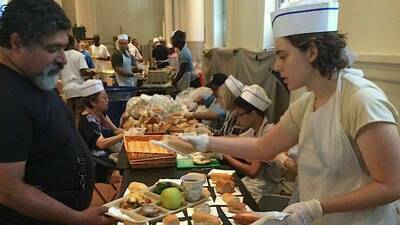
In October, Notre Dame Law School’s Religious Liberty Clinic filed an amicus brief in the U.S. District Court for the District of Oregon case St. Timothy's Episcopal Church et al. v. City of Brookings, advocating for religious organizations’ freedom to serve the hungry.
Since 2009, St. Timothy’s has offered free meals at lunchtime to the hungry. After other churches stopped offering meals in response to the pandemic, St. Timothy’s increased its lunchtime meal service to six days per week in order to meet the growing needs of the Brookings community.
Following complaints from neighbors about St. Timothy’s ministries, the City Council responded by deciding that St. Timothy’s was now in violation of the local zoning code. The City also amended its code to require local churches to apply for a permit to offer meal services for those in need.
Because the permit allows churches to provide meals only twice per week, St. Timothy’s now faces a choice: comply with the ordinance by giving up its religious exercise of providing meals to those in need more than twice per week, or risk facing discriminatory enforcement action by continuing its critical ministry.
The Notre Dame Religious Liberty Clinic’s brief demonstrates that the Religious Land Use and Institutionalized Persons Act of 2000 (RLUIPA) plainly prohibits local governments from putting religious organizations to such a choice.
Bernadette Shaughnessy, a student fellow in the Religious Liberty Clinic, contributed to the brief.
“St. Timothy’s parishioners are fighting for a basic right: the freedom to exercise their religion by providing for the needy in their community. It was a privilege to work on this brief in support of their efforts,” said Shaughnessy.
Order of St. Thomas More members contribute to this mission by investing in the next generation of Notre Dame lawyers and their experiential learning opportunities, creating real impact now and for decades to come.